What Are the Signs of Shock After a Car Accident? Delayed Symptoms to Watch For
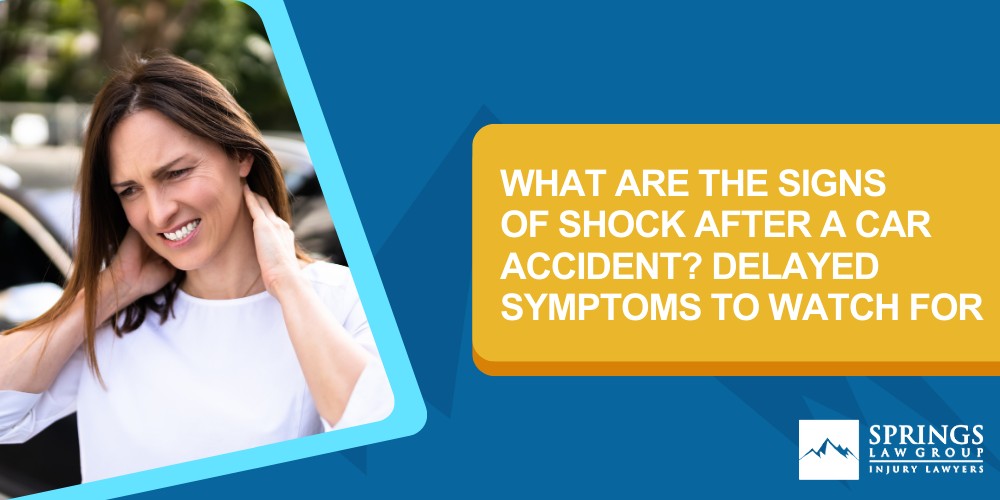
Are you or a loved one suffering after an auto accident?
Getting injured in a car crash takes an enormous toll. People often experience financial loss, physical injury, and even emotional suffering following an accident. Not only are you likely in pain for an extended period, but you could also be dealing with the stress of the insurance company, medical bills, and inability to work.
One issue people don’t talk too much about after a car accident is delayed shock.
The body sometimes goes into shock after a physically traumatic event as a defense response or survival mechanism. When the blood pressure in the body drops, the blood flow is restricted to conserve blood for the vital organs.
The problem is if left untreated, traumatic shock can quickly become dangerous.
Let’s talk about the ways to identify if you or a loved one have experienced delayed shock symptoms after an auto accident and how a Colorado Springs car accident lawyer can help you throughout this traumatic event.
Why Delayed Shock is Such a Big Problem After Car Accidents
The biggest problem with shock after a car accident is that it can be highly hazardous to your health. Restricted blood flow means less oxygen is getting to your organs, which can lead to organ damage down the road if left untreated.
It may not be immediately recognizable if you’re in shock following a trauma like a bodily injury. In fact, because of the adrenaline rush you’re experiencing, your injury may not seem as serious as it actually is. That’s because shock can often cause pain to feel minimal and mask other injury symptoms after an accident.
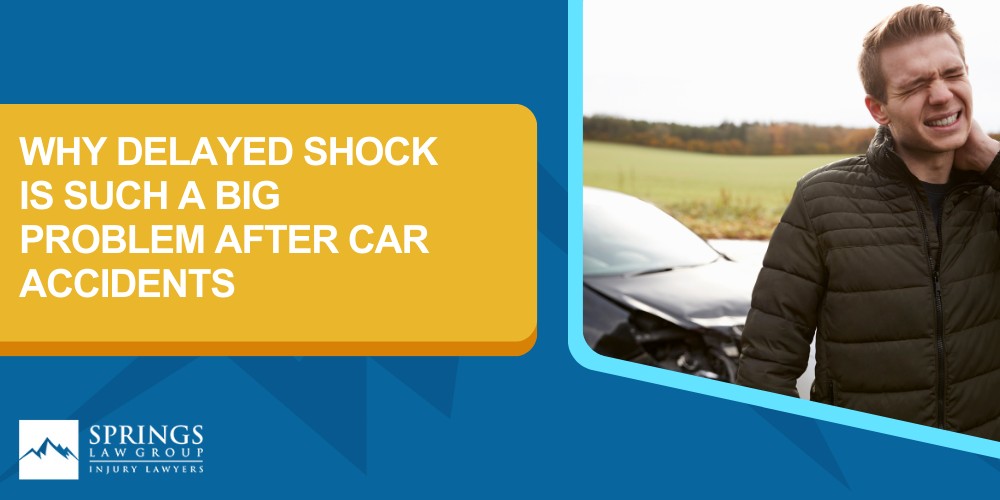
The shock could lead to serious medical issues if medical care isn’t sought immediately. The original injury could also worsen and become life-threatening.
When it comes to car accident settlements, delayed shock can also pose a problem with getting compensated for damages related to the original injury. If treatment isn’t administered quickly, it could be challenging to connect your later medical records to the car accident.
Common Auto Accident Delayed Shock Symptoms to Watch For
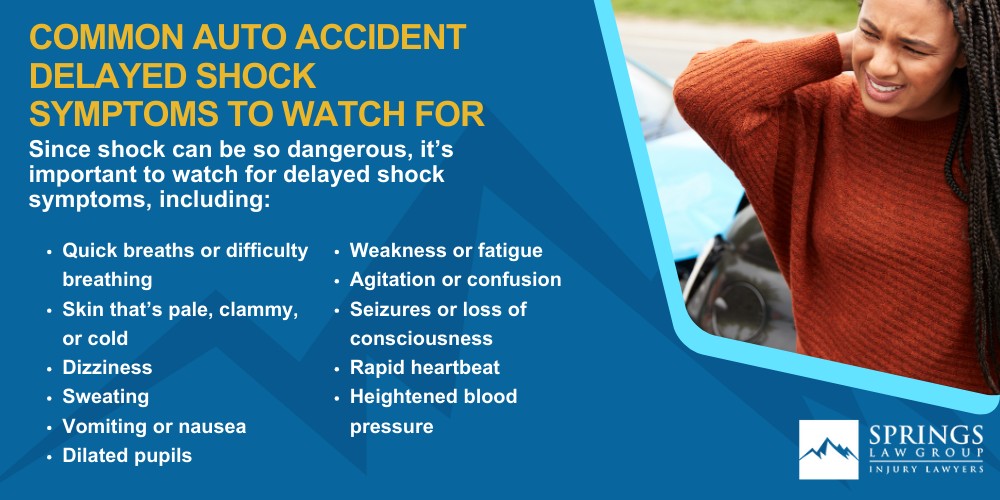
Since shock can be so dangerous, it’s important to watch for delayed shock symptoms, including:
- Quick breaths or difficulty breathing
- Skin that’s pale, clammy, or cold
- Dizziness
- Sweating
- Vomiting or nausea
- Dilated pupils
- Weakness or fatigue
- Agitation or confusion
- Seizures or loss of consciousness
- Rapid heartbeat
- Heightened blood pressure
Types of Shock After Car Accidents
To make matters even more complicated, a few different types of shock could occur after a traumatic accident or injury.
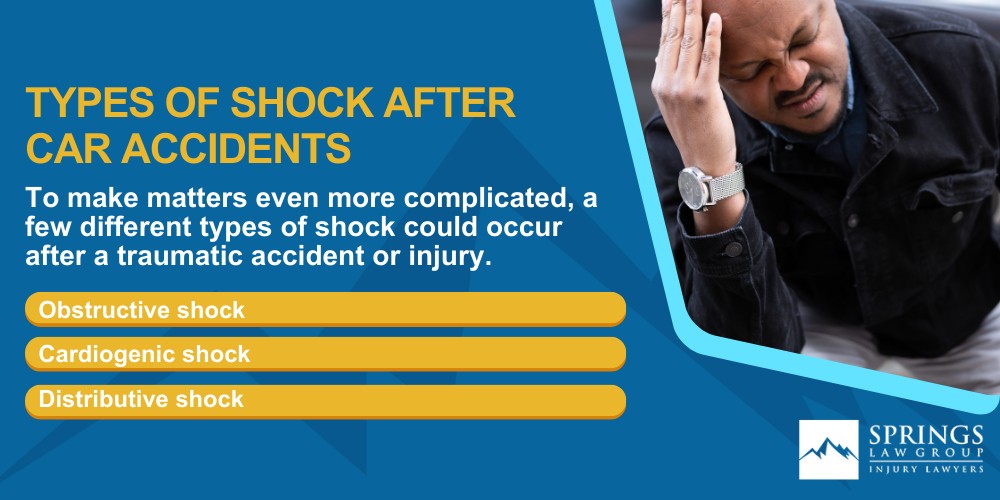
There are four main categories of shock, defined by what the body and the blood flow are doing in response to the trauma:
- Obstructive shock happens when the shock experienced after an injury prevents the blood from going where it needs to go.
- Cardiogenic shock occurs when the heart is damaged or injured and unable to effectively pump blood throughout the body.
- Distributive shock occurs when there is damage to the nervous system, and your blood vessels cannot carry enough blood to your heart and other internal organs. One of the most common examples of distributive shock is septic shock, which occurs when an infection goes untreated for too long.
Psychological Shock and Post-Traumatic Stress Disorder
The effects of a car accident aren’t always just physical. Even if the physical shock is treated and the body recovers from it, people often suffer psychological or emotional shock following a severe car accident trauma. And psychological shock can lead to post-traumatic stress disorder (PTSD) if left untreated.
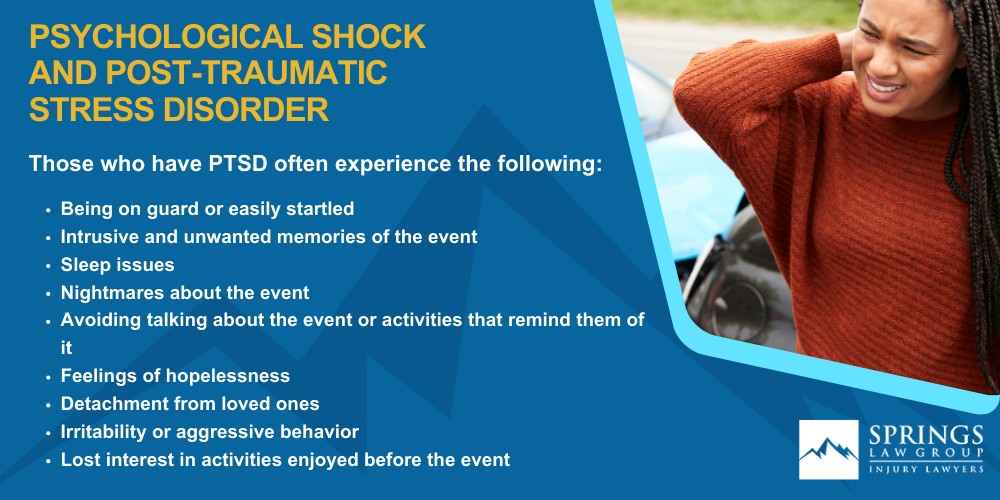
Those who have PTSD often experience the following:
- Being on guard or easily startled
- Intrusive and unwanted memories of the event
- Sleep issues
- Nightmares about the event
- Avoiding talking about the event or activities that remind them of it
- Feelings of hopelessness
- Detachment from loved ones
- Irritability or aggressive behavior
- Lost interest in activities enjoyed before the event
PTSD is a serious condition requiring treatment from a mental health professional to overcome and recover from emotional trauma. If you or a loved one are experiencing psychological shock symptoms or PTSD, seek care as soon as possible.
Colorado Springs Car Accident Lawyers You Can Depend On
When you’ve been in a motor vehicle crash, it’s not always clear what your injuries are, how they’ll impact your life, and what your next steps should be. Delayed shock is an issue that can cause problems to your physical and mental health later on. If you don’t seek treatment right away, you might not be able to seek damages for serious injuries later on.

If you’ve been injured in an auto accident, it’s always best to seek medical attention as soon as possible. Then, contact an experienced car accident lawyer in Colorado Springs to receive maximum compensation for the physical, emotional, and financial damages you’ve incurred.
